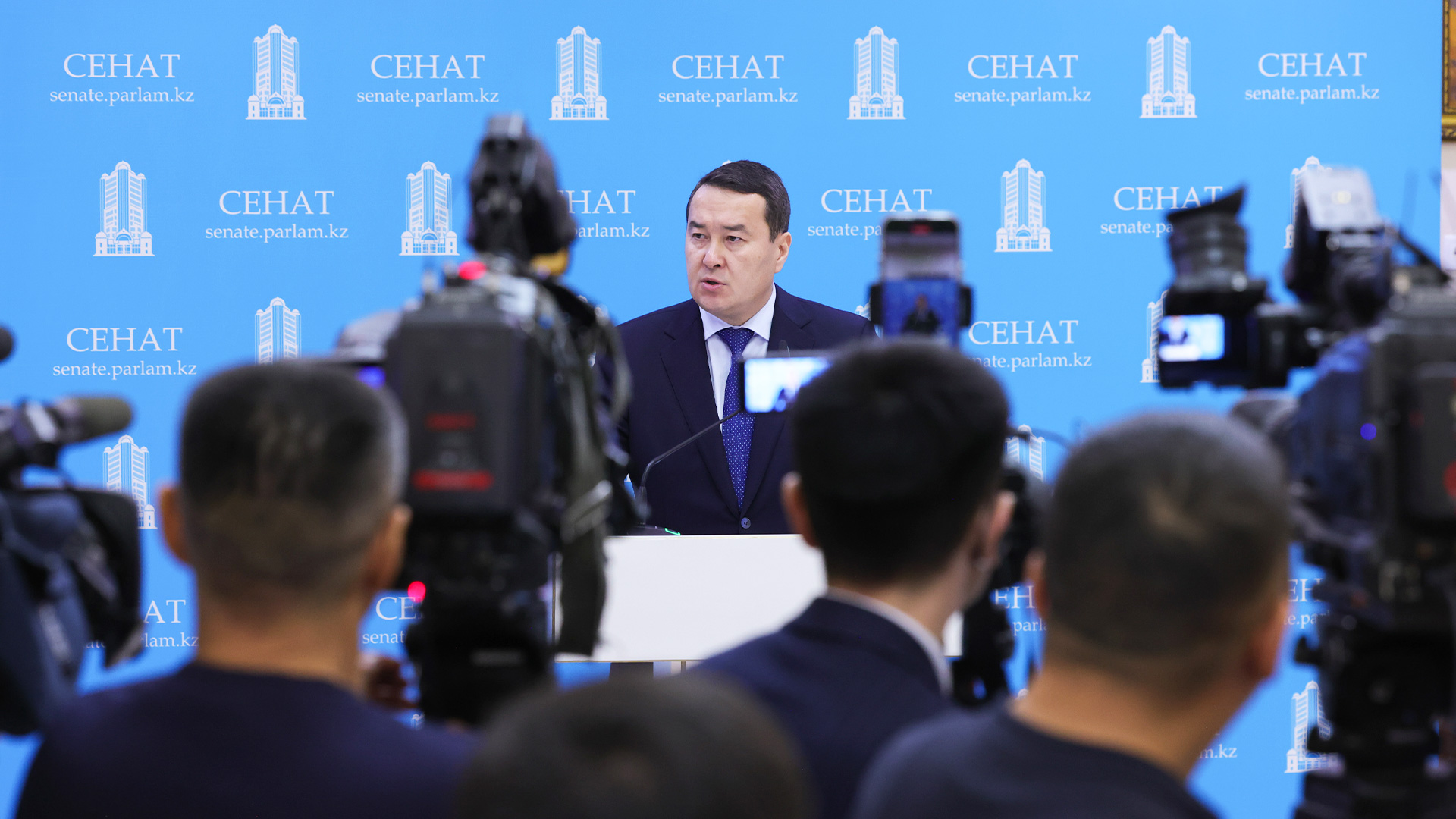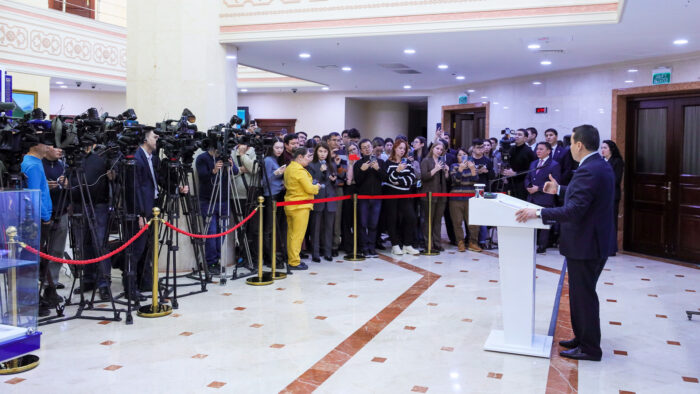ASTANA – Prime Minister of Kazakhstan Alikhan Smailov presented the results of the government’s work in promoting the country’s economic growth and ensuring social justice during the Nov. 23 press briefing, reported the Prime Minister’s press service.

Prime Minister Alikhan Smailov. Photo credit: primeminister.kz.
The head of the Kazakh government spoke about measures aimed to step up asset recovery activities, enhance the regulatory environment for investments, reduce inflation, increase liability for domestic violence, and facilitate access to affordable housing.
Asset recovery
Asset recovery is carried out as a follow-up to the political and economic reforms in Kazakhstan, according to Smailov. The assets returned to the state will be transferred to the Special State Fund to finance socio-economic and infrastructure projects by creating new jobs.

Photo credit: primeminister.kz.
“Assets worth approximately 1 trillion tenge (US$2 billion) have been returned – nearly $600 billion from abroad. The work is in process,” Smailov said.
Kazakh PM noted that illegally acquired assets can be returned voluntarily or compulsorily – based on court decisions. The key purpose, he underscored, is to restore social justice and make assets work for the country’s economy.
Established last month, the Committee for Asset Recovery will also facilitate international legal cooperation. The work of the newly formed structure will be held following the law on the return of illegally acquired assets to the state, which Kazakh President Kassym-Jomart Tokayev signed in July this year.
Investments
Kazakhstan’s economic growth is primarily driven by a well-developed regulatory environment for investments and the steady improvement of appropriate support tools.
“Last year, the volume of foreign direct investment (FDI) into our country reached a record level of $28 billion over the past ten years,” said Smailov. The investments were channeled to the mining and metallurgical complex, the manufacturing industry, trade, transport, and the financial sector.
Kazakhstan has formed a pool of investment projects in non-resource sectors. Smailov highlighted the task the head of state set to attract $150 billion of FDI by 2029.
“There are now 970 projects totaling 32 trillion tenge (US$69 billion). Next year, we plan to implement 400 of them worth 4.6 trillion tenge (US$9 billion),” he said.
For the first half of this year, $13.5 billion of FDI has already been attracted to Kazakhstan. Both the government and local executive authorities are involved in the work.
More than 20 major projects are now being implemented to replace exports and imports. The Prime Minister announced this during the Nov. 17 Kazakhstan Global Investment Roundtable (KGIR) in Astana.
Inflation
The Prime Minister noted that annual inflation peaked in February and fell to 10.8% by the end of October.
“As for today, we observe a twofold decrease. The annual inflation rate is expected to decrease by 10% by the end of this year. This suggests that the relevant set of measures implemented by the government and the National Bank of Kazakhstan is yielding results,” said Smailov.
On the way to halve inflation, Kazakhstan reformatted the work of stabilization funds. The prioritized financing of agricultural producers supports domestic production and stabilizes prices on the market.
The Prime Minister said that the government continues its work towards reducing inflation twice in the midterm up to 5% by 2026.
Strengthening responsibility for domestic violence
Kazakhstan was the first state in the Commonwealth of Independent States (CIS) space to adopt the law on domestic violence prevention in 2009. The amendments introduced since then, Smailov noted, were aimed to increase the liability for domestic crimes.
Speaking about the recently introduced legal changes, the Prime Minister noted extending the arrest term to 15 days, in case of repeated violence – up to 25 days.
He noted that the draft law, submitted to the government in mid-October, contains more than 90 amendments to strengthen responsibility for domestic violence. Most of them have been supported and will be submitted to the Mazhilis, the lower chamber of the Kazakh Parliament.
“I don’t accept any violence against women. I am raising daughters myself, and I want them to feel safe in our country,” Smailov added.
State mortgage programs
Smailov said that the country’s housing programs improved the living conditions of nearly 43,000 Kazakh families over the past three years.
He added that the Otbasy Bank full-fledged development and support institution and Baiterek National Holding are now developing the new 9-20-25 program, which is expected to be launched next year.
“It is planned to attract 150 billion tenge (US$325 million) of extra-budgetary funds annually. The program will provide housing for an additional 8,000 families per year. The conditions of the program are now being reviewed,” said Smailov.
Providing citizens with affordable housing is a priority in Kazakhstan’s domestic policy, especially for large families and families raising children with special needs.

